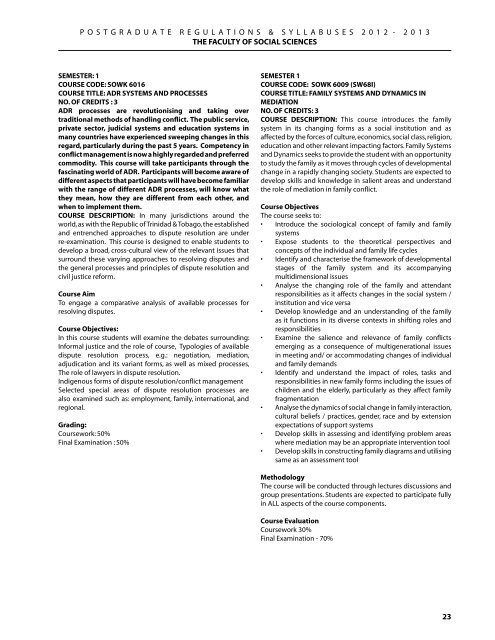Faculty Booklet - The University of the West Indies, St. Augustine ...
Faculty Booklet - The University of the West Indies, St. Augustine ...
Faculty Booklet - The University of the West Indies, St. Augustine ...
You also want an ePaper? Increase the reach of your titles
YUMPU automatically turns print PDFs into web optimized ePapers that Google loves.
P O S T G R A D U A T E R E G U L A T I O N S & S Y L L A B U S E S 2 0 1 2 - 2 0 1 3<br />
THE FACULTY OF SOCIAL SCIENCES<br />
SEMESTER: 1<br />
COURSE CODE: SOWK 6016<br />
COURSE TITLE: ADR SYSTEMS AND PROCESSES<br />
NO. OF CREDITS : 3<br />
ADr processes are revolutionising and taking over<br />
traditional methods <strong>of</strong> handling conflict. <strong>The</strong> public service,<br />
private sector, judicial systems and education systems in<br />
many countries have experienced sweeping changes in this<br />
regard, particularly during <strong>the</strong> past 5 years. Competency in<br />
conflict management is now a highly regarded and preferred<br />
commodity. This course will take participants through <strong>the</strong><br />
fascinating world <strong>of</strong> ADr. Participants will become aware <strong>of</strong><br />
different aspects that participants will have become familiar<br />
with <strong>the</strong> range <strong>of</strong> different ADr processes, will know what<br />
<strong>the</strong>y mean, how <strong>the</strong>y are different from each o<strong>the</strong>r, and<br />
when to implement <strong>the</strong>m.<br />
COUrSE DESCrIPTION: In many jurisdictions around <strong>the</strong><br />
world, as with <strong>the</strong> Republic <strong>of</strong> Trinidad & Tobago, <strong>the</strong> established<br />
and entrenched approaches to dispute resolution are under<br />
re-examination. This course is designed to enable students to<br />
develop a broad, cross-cultural view <strong>of</strong> <strong>the</strong> relevant issues that<br />
surround <strong>the</strong>se varying approaches to resolving disputes and<br />
<strong>the</strong> general processes and principles <strong>of</strong> dispute resolution and<br />
civil justice reform.<br />
Course Aim<br />
To engage a comparative analysis <strong>of</strong> available processes for<br />
resolving disputes.<br />
Course Objectives:<br />
In this course students will examine <strong>the</strong> debates surrounding:<br />
Informal justice and <strong>the</strong> role <strong>of</strong> course, Typologies <strong>of</strong> available<br />
dispute resolution process, e.g.: negotiation, mediation,<br />
adjudication and its variant forms, as well as mixed processes,<br />
<strong>The</strong> role <strong>of</strong> lawyers in dispute resolution.<br />
Indigenous forms <strong>of</strong> dispute resolution/conflict management<br />
Selected special areas <strong>of</strong> dispute resolution processes are<br />
also examined such as: employment, family, international, and<br />
regional.<br />
grading:<br />
Coursework: 50%<br />
Final Examination : 50%<br />
SEMESTEr 1<br />
COUrSE CODE: SOWK 6009 (SW68I)<br />
COUrSE TITLE: FAMILY SYSTEMS AND DYNAMICS IN<br />
MEDIATION<br />
NO. OF CrEDITS: 3<br />
COUrSE DESCrIPTION: This course introduces <strong>the</strong> family<br />
system in its changing forms as a social institution and as<br />
affected by <strong>the</strong> forces <strong>of</strong> culture, economics, social class, religion,<br />
education and o<strong>the</strong>r relevant impacting factors. Family Systems<br />
and Dynamics seeks to provide <strong>the</strong> student with an opportunity<br />
to study <strong>the</strong> family as it moves through cycles <strong>of</strong> developmental<br />
change in a rapidly changing society. <strong>St</strong>udents are expected to<br />
develop skills and knowledge in salient areas and understand<br />
<strong>the</strong> role <strong>of</strong> mediation in family conflict.<br />
Course Objectives<br />
<strong>The</strong> course seeks to:<br />
• Introduce <strong>the</strong> sociological concept <strong>of</strong> family and family<br />
systems<br />
• Expose students to <strong>the</strong> <strong>the</strong>oretical perspectives and<br />
concepts <strong>of</strong> <strong>the</strong> individual and family life cycles<br />
• Identify and characterise <strong>the</strong> framework <strong>of</strong> developmental<br />
stages <strong>of</strong> <strong>the</strong> family system and its accompanying<br />
multidimensional issues<br />
• Analyse <strong>the</strong> changing role <strong>of</strong> <strong>the</strong> family and attendant<br />
responsibilities as it affects changes in <strong>the</strong> social system /<br />
institution and vice versa<br />
• Develop knowledge and an understanding <strong>of</strong> <strong>the</strong> family<br />
as it functions in its diverse contexts in shifting roles and<br />
responsibilities<br />
• Examine <strong>the</strong> salience and relevance <strong>of</strong> family conflicts<br />
emerging as a consequence <strong>of</strong> multigenerational issues<br />
in meeting and/ or accommodating changes <strong>of</strong> individual<br />
and family demands<br />
• Identify and understand <strong>the</strong> impact <strong>of</strong> roles, tasks and<br />
responsibilities in new family forms including <strong>the</strong> issues <strong>of</strong><br />
children and <strong>the</strong> elderly, particularly as <strong>the</strong>y affect family<br />
fragmentation<br />
• Analyse <strong>the</strong> dynamics <strong>of</strong> social change in family interaction,<br />
cultural beliefs / practices, gender, race and by extension<br />
expectations <strong>of</strong> support systems<br />
• Develop skills in assessing and identifying problem areas<br />
where mediation may be an appropriate intervention tool<br />
• Develop skills in constructing family diagrams and utilising<br />
same as an assessment tool<br />
Methodology<br />
<strong>The</strong> course will be conducted through lectures discussions and<br />
group presentations. <strong>St</strong>udents are expected to participate fully<br />
in ALL aspects <strong>of</strong> <strong>the</strong> course components.<br />
Course Evaluation<br />
Coursework 30%<br />
Final Examination - 70%<br />
23
















